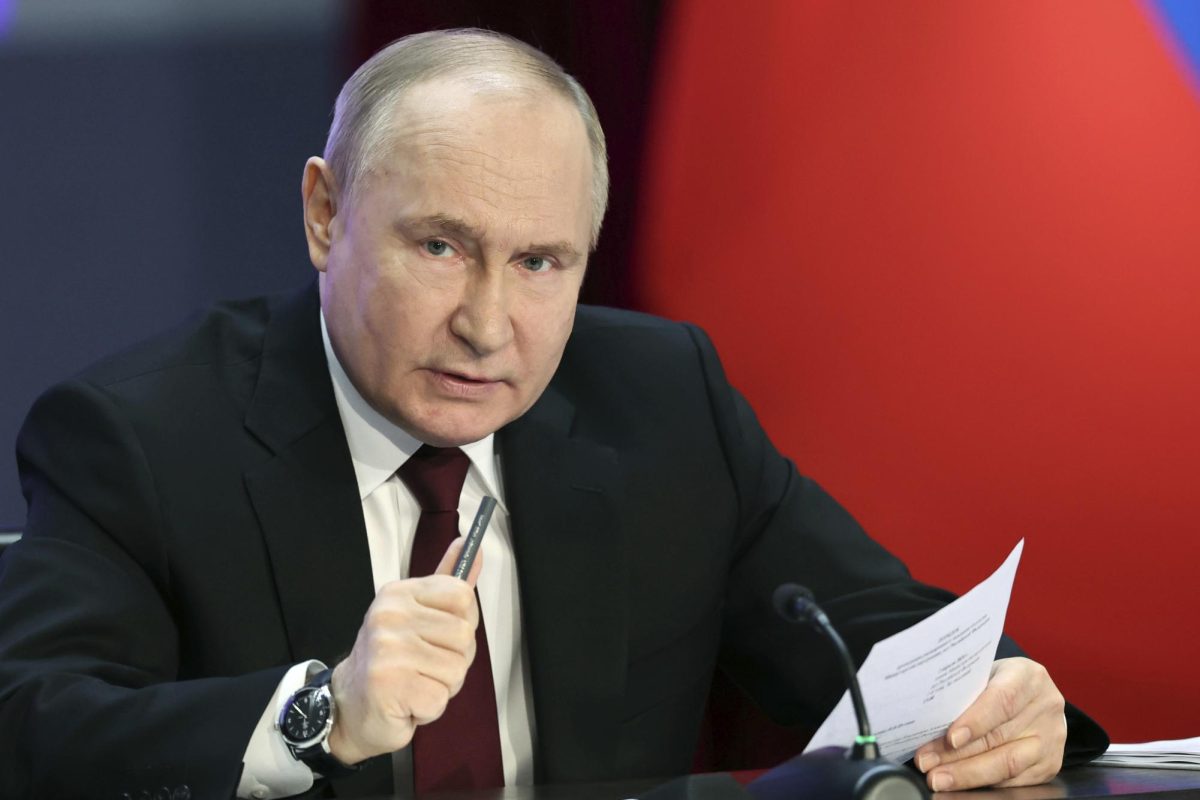Editorial Correction: This piece has been edited to reflect Sun Tzu’s name accurately. The Colgate Maroon-News Editorial Board apologizes for the previous inaccuracy.
On Feb. 24, the world observed the two-year anniversary of what was planned by Vladimir Putin to be a two-day war. Based on the duration of the conflict alone, it is possible to surmise that something may have gone wrong. The overconfidence of the Russian government, its misestimation of Ukrainian strength and a critical misreading of Volodymyr Zelensky has resulted in the most humiliating military failure suffered by any superpower since the Vietnam War. This failure and its consequences can, in my opinion, be attributed to a single factor: arrogance.
The arrogance of the Russian government was likely motivated by the ease with which Russia had interfered in Ukrainian affairs in the past and by a low estimation of Ukrainian leadership. The invasion of Crimea in 2014 took several days, was almost bloodless and saw the defection of nearly three-quarters of Ukrainian forces deployed to the peninsula. Likewise, Russian-backed militias following the Novorossiya movement, which seeks to annex Russian-majority parts of Ukraine to Russia, were able to take control of much of Luhansk and Donetsk provinces. Putin had no need to deploy Russian forces to support them until they faced a serious threat from the Ukrainian military months later. Even before this, some Ukrainian presidents were so close to Russia as to be accused of being clients or puppets, most notably Viktor Yanukyovich, whose decisions favoring the Russians were integral to the success of the 2014 invasion.
Probably, however, the factor that most fueled Russian overconfidence was the President of Ukraine, Volodymyr Zelensky. The fact that a former comedian with no political or military background, who was known for his Adam Sandler-style of ribald comedy, emerged as a stalwart and skilled military leader in the face of an invasion by a superpower is without a doubt one of the greatest surprises in the history of leadership. The Russian invasion plan suggests that Putin expected Zelensky to flee the country at the beginning of the invasion, and that the Russians relied heavily upon this assumption. Zelensky’s flight, they hoped, would precipitate a collapse of the Ukrainian government and military under what was supposed to be a massive morale shock delivered by superior Russian firepower and the stress of being invaded from three directions. Putin no doubt had those three-quarters of the Ukrainian forces in Crimea in mind.
I will not go into the minute details of Russian military planning and preparation; suffice to say, it was utterly terrible. In my assessment, Russian confidence in their military, spurred by decades of being considered one of the world’s great powers, created a culture of complacency at the highest and lowest levels of the Russian military which led to numerous inexcusable mistakes at nearly every level of the organization. The worst offenders were, of course, those with the most responsibility: Putin himself, in addition to Minister of Defense General Sergei Shoigu, who is not a professional soldier but a political appointee with a background in construction, and Chief of the General Staff Valery Gerasimov.
I feel it is fair to assume that nobody in any leadership position had any experience in a conventional war, since Russia had fought only one conventional campaign since the 1990s: the invasion of Georgia in 2008, during which massively superior Russian forces easily overran Georgian positions and occupied part of Georgia. That war was Putin’s first major land grab, and in retrospect, the military ease of it and the lack of a strong response from the West emboldened him in planning his future ones. Clearly, Putin thought that Ukraine would be another Georgia, despite the fact that the Ukrainian military numbered over 200,000 people at the time of the invasion and had spent the eight years since the Russian invasion of Crimea in 2014 re-arming and reforming its military into a crack fighting force with the support of the North Atlantic Treaty Organization (NATO). In my analysis, every war Russia had fought in since the Chechen Wars had been easy fights, with Russia overwhelming much weaker opponents. As a result, they could not fathom that they were facing an equal military power, or that there even were any equal military powers other than the United States and China. Russian superiority was taken for granted, and as a result, that superiority was thrown into the wood chipper.
Russia has suffered the humiliation of being fought to a draw by a country that few had previously considered to be capable of fighting wars at all. I will not elaborate on Putin’s stated intentions for launching this war because he has already done so himself, per the Tucker Carlson Network. In summary, he is a bit of a history buff. Regardless, the Russian invasion of Ukraine was a strategic failure on nearly every level. I argue that apart from limited success in conquering southern and eastern parts of Ukraine, which is clearly much less than they had been hoping for, Russia has gained nothing materially and has, in fact, destroyed much of its powerful position in the international order. Paranoid about NATO expansion against its border, Russia has inadvertently lengthened its border with NATO exponentially, as it has frightened Finland and Sweden into joining the alliance. Militarily, it is now outmatched by other European countries, as Ukraine, Poland and Germany have all beefed up their armed forces. By pushing NATO closer together and forcing them to re-arm, Putin has essentially closed off all of Europe apart from Ukraine to Russian expansion and ruined his own imperial ambitions.
Economically, Russia has been hit hard by the war and now relies heavily on Iran for military supplies. This has put Russia, the former superpower, in a position almost secondary to Iran, which continues to expand its influence throughout the Middle East through factions that used to be joint Russo-Iranian proxies but are now solely Iranian because of Russia’s inability to send resources anywhere but the Ukrainian frontline. Sun Tzu advises leaders that if they know their enemies and they know themselves, then they won’t need to worry about the results of a hundred battles. Sun Tzu’s hyperbole aside, it is clear that Putin knew neither, and now he is paying the price for his arrogance.






